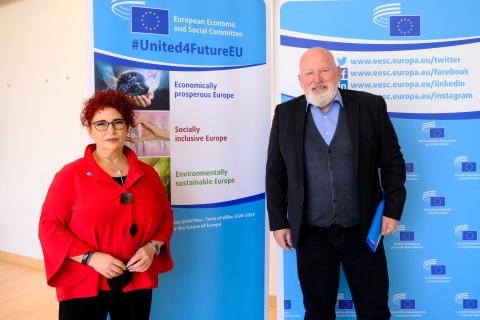European Economic
and Social Committee
"The European Green Deal will be just, or will just not be"
At the EESC June plenary Frans Timmermans announced measures to shield the most vulnerable from the possible extension of carbon pricing to heating and transport fuels, and heard the EESC's proposals to improve corporate decision-making on the green transition through social dialogue.
Welcoming the European Commission Executive Vice-President, Frans Timmermans EESC President Christa Schweng said: "The Green Deal is an ambitious growth strategy for the EU to achieve climate neutrality by 2050 and provide economic impetus, but the social, labour, health and equity dimensions should be strengthened to ensure that no person, community, worker, sector or region is left behind."
Mr Timmermans said that the social dimension of the green transition was the Commission's prime concern, as the pandemic had blown social disparities out of proportion. He described the main elements of the Fit for 55 package to be released on 14 July.
The package would "hardwire social fairness into the new proposals", said Mr Timmermans, by:
- sharing the burden of climate action fairly between industries, governments and individuals, and
- introducing a social mechanism to help soften the impact on the most vulnerable of measures such as the possible extension of emissions trading to heating and transport fuels.
"We must protect vulnerable households against potential price increases for heating and transport fuels, especially in regions where clean options aren’t readily available," said Mr Timmermans. " So if we were to introduce emissions trading for these fuels, that means we must also take our commitment to social fairness a step further. Any proposal on emissions trading in these new sectors must come with a proposal for the social impact at the same time."
As part of the debate, Mr Timmermans heard the EESC's contribution to shaping a social deal integral to the Green Deal. The proposals, set out by rapporteur Norbert Kluge in an opinion entitled No Green deal without a social deal focused on stronger worker participation in corporate decision-making and on corporate social responsibility.
"We believe that by bringing in the workers' voice we can improve the quality of economic decisions that companies make in transitioning to a green model", said Mr Kluge.
"Worker information, consultation and board-level participation tend to favour a more long-term approach and improve the quality of decision-making in an economic reform agenda." said Mr Kluge.
However, the EESC stresses that a social deal as an essential part of a green deal is not just related to work. It is about income, social security and fiscal support for all who need it, including those without any access to work at all. (dm)
